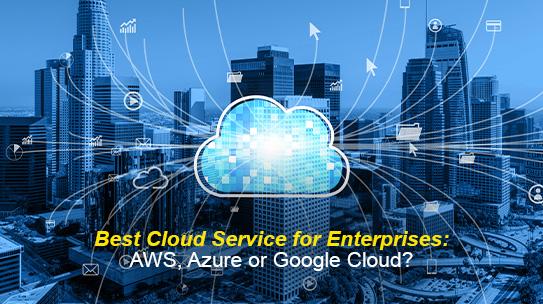
We have come a long way from not having knowledge about cloud computing technology to deciding which is the best cloud computing provider in the market. Although there are numerous cloud providers, the best are Mircosoft’s Azure, Amazon’s AWS, and Google’s Google Cloud.
Brief: Cloud Computing
We need more computing power as our requirements increase with time. More processing power, RAM, faster disk storage, and an improved hardware stack empower quick responses. Cloud computing involves providing services on-demand through the internet, such as processing power and app storage.
Services based on Cloud can be accessed and utilized by businesses based on a pay-per-use. Renting cloud-based services from a third party gives businesses the power to avoid investing in and incurring upfront costs for computing equipment. Service providers are upgrading because they can offer comparable services to their customers.
Microsoft Azure and Google Cloud are quickly booming to compete with AWS. Regarding storage and services, AWS currently tops the industry. Azure, with its aim on enterprises, is chasing after AWS. While open-source programs and third-party companies integrate with Google, it’s continuously growing.
Top cloud service providers
Amazon Web Services
Amazon Web Services (AWS) is an ancillary of Amazon, delivering a pay-per-usage cloud computing service to individuals, businesses, and governments. AWS, a company with years of knowledge and experience, dominates the cloud computing sector. It has established a more extensive base of users and greater trust and reliability due to its past as one of the oldest cloud providers.Microsoft Azure
Microsoft Azure launched the Microsoft Azure Cloud Computing platform for companies in 2010 under the name Azure. Microsoft Azure has shown major progress since its establishment compared to its competitors. With Microsoft Azure, businesses can quickly move to a cloud environment or hybrid cloud tailor-made specifically for Microsoft-centric businesses.
Google Cloud Platform
The Google Cloud Platform (GCP) is an array of cloud computing services based on the same infrastructure used internally by Google to power its end-user products, including the Google Search engine and YouTube.
In less time span, Google Cloud Platform has established itself in the cloud industry. Initially, the Google Cloud Platform was designed to bolster Google Search and YouTube – two of the company’s most popular products. Today, the Google Cloud Platform allows anyone to use the same infrastructure as Google Search and YouTube. This makes it possible for developers to create products and services on par with Google’s offerings.
Comparison of Cloud service providers: Which one is best for enterprises?
Cloud Computing:
In Amazon’s exclusive computing service, Elastic Compute Cloud (EC2), flexibility and cost-effectiveness come together. With compatibility with AWS, EC2’s auto-scaling monitor ensures you only pay for what your cloud applications consume, automatically adjusting to current needs. The AWS cloud not only offers EC2 but also features Kubernetes container services (EKS), making it a comprehensive solution for various computing needs.
Microsoft’s Azure, boasting open-source cloud platforms, provides complete computing services encompassing application development, deployment, pre-deployment testing, and more. Azure’s hybrid option supports both cloud hosting and on-site private computing, offering versatility to organizations with diverse needs.
Google’s Compute Engine (GCE), although catching up to competitors, stands out with perks like Cloud Functions, allowing cost-efficient deployment of cloud applications with payment only for the utilized code. Kubernetes-based services like KKE and Knative add to Google’s cloud offerings.
Also Read: Top 10 Analytical Tools To Improve Your Business Analysis
Technologies for storage:
In Amazon’s cloud storage options, Simple Storage Service (S3) and Elastic Block System (EBS) shine, while AWS Elastic File Storage provides scalability beyond average requirements. ElastiCache ensures low-latency access to data, and AWS assists with SQL-assisted databases and data migration for seamless transitions.
Azure’s cloud storage services cater to various business needs, offering options like Azure Queue Storage and Azure Data Lake Storage for organizations with high data storage requirements. Azure’s hybrid approach with Server Stretch is especially intriguing, allowing entities to use Microsoft SQL Server on-premises and cloud-based data storage.
Google’s storage options, although relatively basic, cover both SQL and no-SQL databases, ensuring reliability and comprehensiveness. Online transfer services are expanding with the introduction of Google and in-house transfer services, while backup options like Coldline and Nearline cater to different data access frequencies.
Tools for development:
AWS, Azure, and GCP engage in competition, offering tools and services aligned with the latest trends. AWS introduces SageMaker for machine learning and AI execution, Azure features AI enhancement and Cognitive Services with API-based integration, and Google provides cloud-based enterprise features for global collaboration and connectivity.
Hybrid and Multi-Cloud Options:
AWS addresses hybrid deployments with solutions like Amazon EKS Anywhere, AWS Snowball, AWS Outposts, and others, offering flexibility in utilizing AWS services both on-premises and in the cloud.
Azure’s hybrid deployment solution, Azure Stack, is designed for deploying Azure public cloud services from a local data center, providing businesses with the benefits of the public cloud while keeping some data on-premises.
Google Cloud’s Anthos hybrid cloud platform combines existing Google Kubernetes Engine (GKE) and GKE On-Prem, simplifying the administration, management, and security of hybrid Kubernetes deployments.
Comparison on price basis:
Pricing across AWS, Azure, and Google Cloud is influenced by factors such as customer requirements, usage, and services utilized. All three platforms offer competitive pricing plans, along with additional cost management options like reserved instances, budgets, and resource optimization tools. The choice between them depends on specific organizational needs and preferences.
Conclusion
Currently, the top player in cloud computing is AWS, but Azure and Google Cloud are not far behind in chasing the bar by AWS. With its major focus on the enterprise, Azure, in particular, is hot on AWS’ heels. Meanwhile, Google’s reach continues to expand via integration with open-source programs and third-party businesses.
Every business has its specific requirements in terms of cloud computing. As the industry matures, most businesses are seeking multi-cloud solutions that allow them to take advantage of the benefits of each cloud service without being tied to a single one.